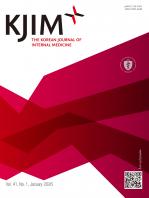|
Review / Brief Communication
Current laboratory diagnosis of coronavirus disease 2019
Jihyang Lim, Jehoon Lee
Korean J Intern Med. 2020;35(4):741-748. Published online July 1, 2020
Coronavirus disease 2019 (COVID-19) emerged in December 2019 in Wuhan, China; it has since caused a pandemic, with more than 10,000 confirmed cases (> 800,000 tests) in Korea as of May 2020. Real-time reverse transcription polymerase chain reaction (RT-PCR) is currently the most commonly used method..
|
|
|
Gastroenterology / Original Article
Outcomes and clinical relevance of stool multiplex bacterial polymerase chain reaction in patients with acute diarrhea: single center experience
Won Gun Kwack, Yun Jeong Lim, Ki Hwan Kwon, Jae Woo Chung, Jin Young Oh
Korean J Intern Med. 2020;35(2):300-309. Published online January 29, 2019
Background/Aims: Diagnostic stool multiplex polymerase chain reaction (PCR) testing has attracted considerable interest, because of its high sensitivity, short turnaround time, and ability to detect multiple organisms simultaneously. This study investigates the clinical usefulness of a stool multipl..
|
|
|
Pulmonology / Original Article
Use of serology and polymerase chain reaction to detect atypical respiratory pathogens during acute exacerbation of chronic obstructive pulmonary disease
Chi Young Jung, Yeoung Hun Choe, Sang Yeub Lee, Woo Jin Kim, Jong Deog Lee, Seung Won Ra, Eu Gene Choi, Jae Seung Lee, Myung Jae Park, Ju Ock Na
Korean J Intern Med. 2018;33(5):941-951. Published online June 25, 2018
Background/Aims: To use serological and multiplex polymerase chain reaction (PCR) assays to examine sputum samples from patients experiencing acute exacerbation of chronic obstructive pulmonary disease (AECOPD) for the presence of atypical pathogens, including Mycoplasma pneumoniae, Chlamydia pneumo..
|
|
|
Pulmonology / Original Article
Clinical significance of positive Pneumocystis jirovecii polymerase chain reaction in non-human immunodeficiency virus immunocompromised patients in a real practice
Hea Yon Lee, Hye Seon Kang, Hwa Young Lee, Chin Kook Rhee, Sook Young Lee, Seok Chan Kim, Seung Joon Kim, Yeon Joon Park, Young Kyoon Kim, Ji Young Kang
Korean J Intern Med. 2017;32(3):478-485. Published online December 13, 2016
Background/Aims: Pneumocystis jirovecii polymerase chain reaction (PCR) can be helpful in diagnosing Pneumocystis pneumonia (PCP); however it has limitations. We evaluated the prevalence of positive P. jirovecii PCR from non-human immunodeficiency virus (HIV) immunocompromised p..
|
|
|
Infectious diseases / Original Article
Utilization of the respiratory virus multiplex reverse transcription-polymerase chain reaction test for adult patients at a Korean tertiary care center
Mi Young Ahn, Seong-Ho Choi, Jin-Won Chung, Hye Ryoun Kim
Korean J Intern Med. 2015;30(1):96-103. Published online December 30, 2014
Background/Aims: Respiratory viruses (RVs) are considered to be important respiratory pathogens in adult patients, and the multiplex reverse transcription-polymerase chain reaction (RT-PCR) test is used frequently in adult patients with respiratory infections. However, clinical data regarding utiliz..
|
|
|
Original Article
Diagnosis and Species Identification of Mycobacterial Infections by Polymerase Chain Reaction-Restriction Fragment Length Polymorphism Analysis of Sterile Body Fluids
Cheong Ho Cho, Sang Hoon Han, Bum Sik Chin, Suk Hoon Choi, Han Sung Lee, Chang Oh Kim, Myung Soo Kim, Jun Yong Choi, Young Goo Song, June Myung Kim
Korean J Intern Med. 2009;24(2):135-138. Published online June 8, 2009
Background/AimsThe development of effective, accurate, and rapid diagnostic methods for Mycobacterium infection and mycobacterial species identification is required. Polymerase chain reaction-restriction fragment length polymorphism (PCR-RFLP) is an easy, rapi..
|
|
|
















